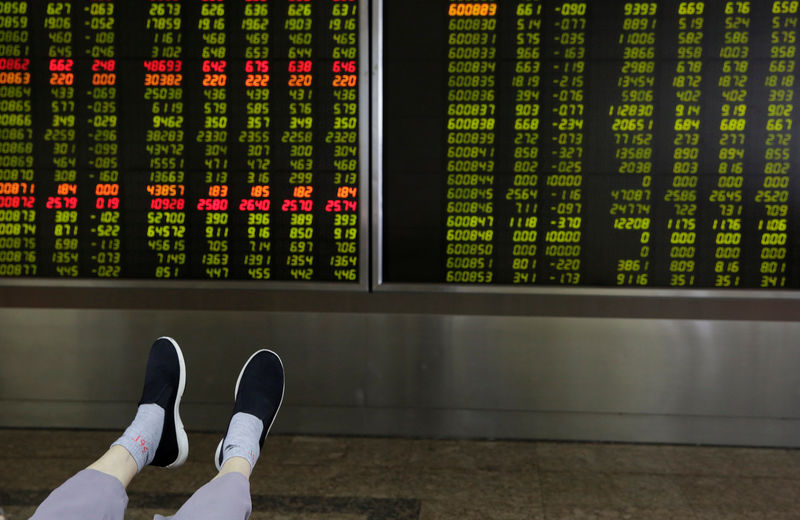By Andrew Galbraith and Winni Zhou
SHANGHAI (Reuters) - China's stocks slumped Wednesday after three days of gains and the yuan weakened as the United States threatened more import duties on Chinese goods, sharply escalating the trade conflict between the world's two biggest economies.
China's commerce ministry said it was "shocked" by Washington's latest move, which comes just days after both countries imposed tit-for-tat tariffs on $34 billion of each other's goods, and ups the ante in a heated trade dispute that has rattled global financial markets.
The Shanghai Composite index (SSEC) fell 1.8 percent, and the blue-chip CSI300 index (CSI300) dropped 1.7 percent.
Investors have been particularly worried that the trade row could harm an already slowing Chinese economy in a blow to global investment and growth. Analysts said domestic concerns would also weigh on shares.
"Judging from (China's) economic fundamentals and corporate earnings expectations, which are under pressure amid the trade war with the United States, the stock market is yet to reach a bottom," said Yan Kaiwen, an analyst with China Fortune Securities.
Beijing's commitment to its ongoing deleveraging campaign means that tight credit conditions will continue, Yan said.
State media cast news of new tariffs and slumping shares in a different light.
The news could "bring some negative emotion to financial markets in the short term, but over the long run, fundamentals of Chinese financial markets have not changed, and (investors) shouldn't over-value its impact," Guan Tao, former director of the international payments department at China's State Administration of Foreign Exchange (SAFE) was quoted as saying by the state-owned Xinhua news agency.
Airline shares, which have suffered in recent weeks amid rising oil prices and a falling yuan, were hit particularly hard on Wednesday. Investors fear that a falling yuan could add to fuel costs and the debt-servicing load of companies with dollar-denominated debts.
China Southern Airlines (SS:600029) and Air China (SS:601111) fell more than 6 percent, and China Eastern Airlines (SS:600115) dropped 5.7 percent. The broader CSI300 transport sub-index <.CSI300TRANS> lost 2.6 percent.
Hong Kong's Hang Seng index (HSI) fell 1.3 percent, with the China Enterprises index (HSCE) giving up 1.5 percent.
Investors were wary of China response to the latest U.S. tariff threat, as the country's assistant commerce minister said the proposed U.S. duties harm the World Trade Organization system and globalization.
"It is impractical for China to match tariffs by quantity," said Frances Cheung, head of Asia macro strategy at Westpac in Singapore. "If the U.S. goes ahead with more, China needs a combination of tools and it is prudent to guard against downside risk to growth too."
She said the downside risk to growth mainly stemmed from trade tensions.
RISK TO EXPORTS
The threat of additional tariffs on $200 billion worth of goods "would mean that around half of Chinese exports of goods to the U.S. would face significant U.S. punitive tariff measures," Rajiv Biswas, Asia Pacific Chief Economist at IHS Markit, said in a note.
"China's export sector will therefore suffer a significant deterioration in export competitiveness to the U.S. compared to other emerging markets' manufacturing exporters."
The trade war anxiety extended to China's yuan. Traders said they were keeping an eye on the key 6.7 per dollar level as pressure mounted on the currency.
However, the market wasn't aggressively testing that level due to concerns it could prompt intervention, they said.
Several traders said they saw some dollar selling by large state banks in the spot market, which went some way to supporting the yuan, though they did not know whether U.S. dollar liquidity offered by the banks was on behalf of the central bank or corporate clients.
The onshore yuan

The offshore yuan